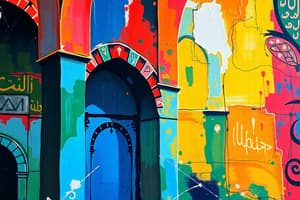Podcast
Questions and Answers
Which of the following elements of Islamic architecture is primarily focused on the aesthetic representation of written language?
Which of the following elements of Islamic architecture is primarily focused on the aesthetic representation of written language?
- Arabesque
- Geometric Pattern
- Calligraphy (correct)
- Play of Light
What role does water play in Islamic architecture?
What role does water play in Islamic architecture?
- It is used primarily for irrigation.
- It serves as a building material.
- It emphasizes visual axes and cools the environment. (correct)
- It is mainly decorative, with no additional function.
Which of the following best describes the characteristics of geometric patterns in Islamic architecture?
Which of the following best describes the characteristics of geometric patterns in Islamic architecture?
- They reflect randomness and chaos.
- They are solely based on calligraphic inscriptions.
- They exemplify repetition, balance, and symmetry. (correct)
- They are predominantly floral in design.
Which type of Islamic structure is primarily used for education?
Which type of Islamic structure is primarily used for education?
What characteristic defines arabesque designs in Islamic architecture?
What characteristic defines arabesque designs in Islamic architecture?
What is the primary function of a minaret in a mosque?
What is the primary function of a minaret in a mosque?
What architectural element indicates the direction for prayer within a mosque?
What architectural element indicates the direction for prayer within a mosque?
Which of the following structures is specifically used for the delivery of messages in a mosque?
Which of the following structures is specifically used for the delivery of messages in a mosque?
What feature serves as a courtyard combined with an ablution area in a mosque?
What feature serves as a courtyard combined with an ablution area in a mosque?
What is the purpose of the domes found in mosques?
What is the purpose of the domes found in mosques?
What architectural element is characterized by carved wood latticework and projects from a window?
What architectural element is characterized by carved wood latticework and projects from a window?
Which of the following elements in a mosque is typically designed to span a space and support weight?
Which of the following elements in a mosque is typically designed to span a space and support weight?
Which structure in a mosque is primarily defensive and includes a parapet?
Which structure in a mosque is primarily defensive and includes a parapet?
Flashcards
Islamic Calligraphy
Islamic Calligraphy
A visual art form in Islamic architecture focused on elegant writing, often linked to geometry and mathematics, used to decorate buildings like doorways and cornices.
Arabesque
Arabesque
A type of Islamic decorative art featuring organic, flowing patterns inspired by nature, often used to decorate textiles, objects and buildings.
Geometric Pattern
Geometric Pattern
A distinctive feature of Islamic architecture where repeating patterns, symmetry, and balance are key elements. Often integrated with light effects and color contrasts.
Play of Light
Play of Light
Signup and view all the flashcards
Water in Islamic Architecture
Water in Islamic Architecture
Signup and view all the flashcards
Mashrabiya
Mashrabiya
Signup and view all the flashcards
Mihrab
Mihrab
Signup and view all the flashcards
Sahn
Sahn
Signup and view all the flashcards
Minaret
Minaret
Signup and view all the flashcards
Dome
Dome
Signup and view all the flashcards
Dikka
Dikka
Signup and view all the flashcards
Muqarnas
Muqarnas
Signup and view all the flashcards
Praying Area Hall
Praying Area Hall
Signup and view all the flashcards
Study Notes
Islamic Architecture Time Period
- Spanning from 622 AD to 1600 AD.
Islamic Architecture Elements
- Calligraphy: A visual art form related to writing, closely connected to geometry in Islamic design. Proportions are mathematically precise. Inscriptions are frequently used as decorative elements, framing portals and cornices.
- Geometric Patterns: Showcase a strong interest in repetition, balance, symmetry, and continuous patterns. Geometric shapes are integrated with optical effects, such as balancing positive and negative areas. Color and tone values are skillfully used.
- Arabesque: Also known as Islimi, it's a biomorphic design filled with floral patterns, accurately depicting natural forms like flowers and trees. Used to decorate textiles, objects, and buildings.
Islamic Architecture Play of Light
- Light enhances architectural features. The interplay of light and shadows creates strong contrasts, providing texture to sculpted stone and brickwork.
Islamic Architecture Water
- In hot climates, water features like courtyards, pools and fountains play a dual role. They cool the environment while serving as decorative elements, reflecting architecture and motifs.
Islamic Architecture Types
- Mosque: A place of worship.
- Madrasah: A public school.
- Hammam: A hot bathhouse.
- Caravanserai: A roadside inn for travelers.
- Casbah/Citadel: A fortress.
- Mausoleum: A tomb or monument.
Mosque Features
- Mashrabiya: A projecting window enclosed with carved wood latticework.
- Mihrab: A semicircular niche in the wall of a mosque, marking the qibla (direction of Mecca).
- Sahn: A courtyard area often combined with ablution (ritual cleansing) areas.
- Minaret: A visual focal point used for the call to prayer.
- Dome: A focal point, covering the main prayer hall.
- Dikka: A place for delivering royal messages.
- Muqarnas: Stalactite vault, a Persian architectural ornament.
- Praying Area Hall: Main area for congregational prayers.
- Arch: Spanning architectural structure supporting weight.
- Battlement: Defensive element, comprising a parapet.
Taj Mahal Visual Description
- Contains Lotus decorations (Hindu symbol) and Chattris (domes and colonnaded kiosks)
- Minarets (40m tall cylindrical columns with beveled angles)
- Arches (also called Pishtaqs) and a Base
- Onion Domes, Drums (cylindrical bases), Guldastas (decorative spires)
- Spandrels (space between arches and rectangular enclosings)
- Calligraphy or inscriptions on large arches or dados (decorated frames with Pietra dura inlay work)
Studying That Suits You
Use AI to generate personalized quizzes and flashcards to suit your learning preferences.




